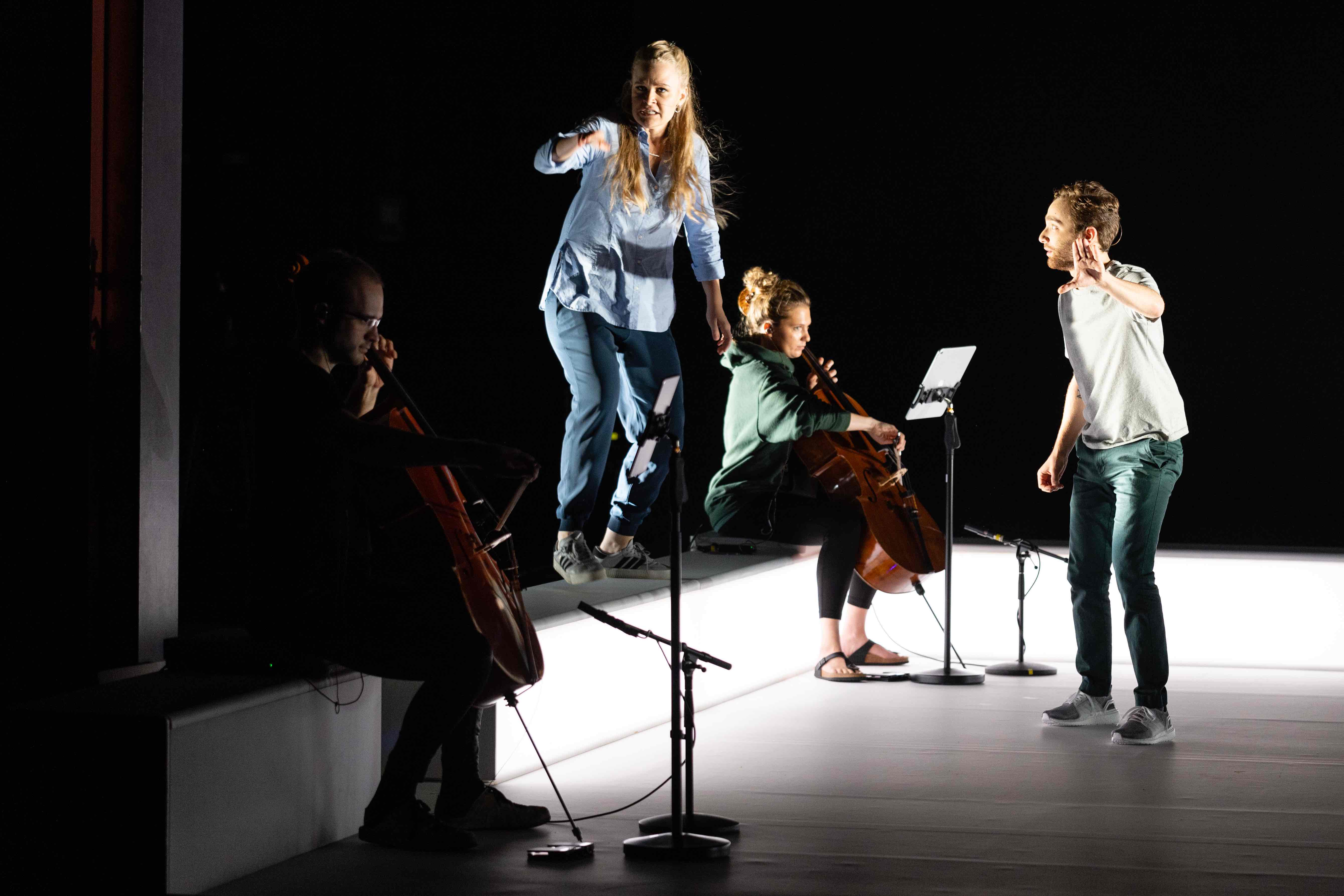Reviews
Philadelphia's O19 Gets Underway with the Brilliant Denis & Katya
If you caught Philip Venables’s opera of Sarah Kane’s 4:48 Psychosis at last season’s NYC Prototype Festival, you’ll know he doesn’t fight shy of harrowing subject matter. Yet although Denis & Katya, which opened at the Suzanne Roberts Theater on September 18 as part of Opera Philadelphia’ s O19 Festival, has suicide in common with the earlier work, the two could not be more different. Not only is Venables’s newest creation the most brilliantly original operatic work I’ve seen in a decade, it’s a sensitive, subtle, and deeply questioning meditation on youth, voyeurism, and the age of social media.
The opera explores events surrounding a pair of Russian 15-year-olds who holed up in an abandoned cabin following a family argument and died three days later after a shoot-out with police. The 2016 drama, which took place in the village of Strugi Krasnyye in Russia’s western Pskov region, was live streamed on the video app Periscope by the boy, Denis, and his girlfriend Katya. The story, likened by some to Romeo and Juliet, was watched by dozens and widely reported at the time. Venables and his co-creators, director Ted Huffman and dramaturge Ksenia Ravinna, constructed their fictionalized libretto after lengthy research and interviews with friends, residents, and others on the scene.
 Siena Licht Miller and Theo Hoffman are "pretty much ideal" in multiple roles
Siena Licht Miller and Theo Hoffman are "pretty much ideal" in multiple roles
Where lesser collaborators might have produced a gory romance of teenage angst and the evils of the internet, Venables and co decided that since voyeurism was one of their subjects, their two singers should never appear as the children. Instead, they play the parts of a journalist, Denis’s best friend, a neighbor, a teenager, a teacher, and a medic in a series of interviews. Musical scenes are punctuated by spoken narrations describing the video stream plus—and this is sheer genius—excerpts from email exchanges between the creators as they wrestled with how to wrangle the story into an opera.
The two main characters—The Journalist and The Friend—are sung by the mezzo and the baritone respectively, while the other performer provides additional spoken text. The Neighbor (mezzo) and The Teenager (baritone) are both sing in Russian, each speaking the translation of the other’s sung lines. The Teacher and The Medic are sung in duet, in English by both. What emerges, thanks to Venables’s scrupulous setting and Huffman’s inspired yet clinical direction, is both a sophisticated piece of storytelling and a miracle of clarity.
It may sound perverse to have scored an opera for four cellos, but it allows Venables to tap into a rich vein of melancholy. Where 4:48 Psychosis was all jagged rage, Denis & Katya skillfully blends reflective arioso with outbursts of dramatic frenzy. Tapping into a sound world not inappropriately reminiscent of Shostakovich, the four cellists engage in propulsive rhythms, long-limbed lyrical melodies, spiky pizzicatos, and off-kilter glissandos. When they all fire up together, like in the panicky sections accompanying the reminiscences of The Neighbor, they pack quite a punch. The folk-inflected chaconne that underpins the final reflections of The Journalist, on the transience of news, and The Friend, on his desire to move on, is deeply emotional tonal music. Electronics provide the final element, a metrical beat accompanying the collaborators’ typed words projected onto the backdrop.
By looking into the story from the outside, Venables, Huffman and Ravinna are able to investigate not just the tragedy and motivations of two children who grew up projecting versions of themselves into a world of social media, but also their virtual audience, one whose demands ignore the consequences to a pair of troubled human beings. As the collaborators disclose their own temptations to sensationalize the story and the rationale behind their decision not to show actual footage of the events, they shine a light on all of our tendencies to peer into a passing car wreck for the frisson of catching a glimpse of something grizzly. The projection of increasingly prurient online comments from viewers engaging with the children in real time—comments like “show us your tits before you die”—is perhaps the work’s most horrific element.
Andrew Lieberman’s bare set and stark lighting allows Huffman to focus on his two performers with minimum distraction aided by Rob Kaplowitz’s sound design—the singers are subtly miked for speaking over music—and Pierre Martin’s minimal video design. Although the show is unconducted in performance, Emily Senturia’s musical direction is accomplished and sure-footed.
Theo Hoffman and Siena Licht Miller prove pretty much ideal, their young voices well matched. Both are consummate, committed actors, capable of the considerable musical challenge and the equal demands of substantial quantities of spoken text (the only sections that could benefit from greater pace). Hoffman captures the gentle pathos of The Friend, a child who still can’t believe it all ended in tragedy. By contrast, his antsy Teenager is all pent-up judgmental anger. Vocally, his warm baritone purrs and soars. Miller’s wine-dark mezzo captures the world weariness of the lugubrious Journalist and the high-stakes passion of the uniquely Russian Neighbor. At 70 minutes, theirs is a two-handed tour de force.
In his program note, Venables admits to being unsure what they have created, describing the work as “a kind of fictionalized verbatim/documentary/reconstruction/role-play theater.” What is certain is that Denis & Katya is quite magnificent, and unlike anything else on the operatic stage. As such it points the way forward for an art form that can too often be found facing the other way.





 FEATURED JOBS
FEATURED JOBS

 RENT A PHOTO
RENT A PHOTO


